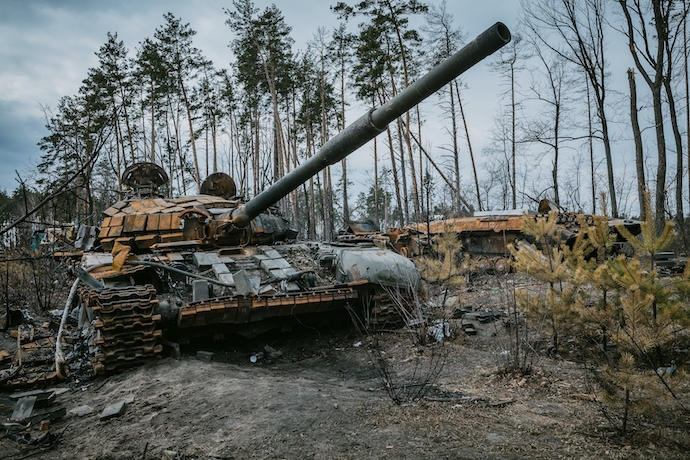
Self Defense in the Information War
Information war has been part of war since wars were first written about (or since there was information about war). In past wars, information operations were directed toward other governments and a government’s own people. This war is different. While Russia seems to be following that older methodology, Ukraine’s use of information warfare is revolutionary.
For both sides, current information technologies and networking enables new ways to shape and influence the attitudes and actions of all participants in the global information environment (and we are all participants in that environment). It is important to understand that each of us is a target in this information war, that both sides are seeking to influence each of us to action or inaction. The question is how to defend ourselves from being influenced to make the wrong choices.
For both Russia and Ukraine, their information warfare successes use multiple approaches to present information which the intended audience is already inclined to hear. This is important. Effective information operations exploit what the target already believes or wants to believe. For example, Ukraine’s information campaign leverages on the Western predisposition to favor the underdog in a fight.
Understanding Western liberal democracies – perhaps better than the political elites in those democracies – Ukraine’s information is directed towards the citizens of America and Western Europe, rather than the political elite. The messages are of individual heroism and ingenuity. Husbands and fathers who assure the safety of their families and then return to the fight. Grandmothers confronting Russian soldiers. Farmers towing away fighting vehicles that are either abandoned or temporarily unoccupied by their crew.
Patron received his recognition. Among those who save the lives of 🇺🇦 every day are four-legged heroes. The most famous among them is Patron, a bomb-sniffing dog. In the presence of @JustinTrudeau, @ZelenskyyUa presented him an award “For Dedicated Work in the #UAarmy“. pic.twitter.com/mssSTlfIKW
— Defence of Ukraine (@DefenceU) May 9, 2022
It is multi-faceted, including social media, YouTube, email, and other electronic communication. It includes real footage and some that is staged, to include the distribution of very believable computer-generated imagery. Western governments, including the United States government, were initially reluctant to take decisive steps in response to the invasion, such as a complete embargo of Russian exports or providing the full spectrum of military hardware and software Ukraine needed.
Over the course of several weeks, and with seeming reluctance, Western governments responded to popular pressure and began to supply ever greater amounts of materiel and impose more serious economic actions against Russia. Another example is the establishment of the International Legion for the Territorial Defense of Ukraine. This is another front in the information warfare campaign. Through the Legion, Western nations see their own citizens volunteering to defend Ukraine. It also helps reinforce the morale of the Ukrainian people, as they see people from many other countries coming to their defense.
It almost certainly helps that Volodymyr Zelensky, the president of Ukraine, comes from the entertainment industry. Zelensky understands how to tell a story that resonates with people.
Russia, on the other hand, seems to follow the older method of information warfare, targeting other governments and its own people. This has not been entirely unsuccessful. At the strategic level, Russia achieved notable successes leading up to the invasion in February. Their greatest success was convincing the West that Russia’s military forces were much more capable than was the case.
This, despite a poor Russian track record in Chechnya and Georgia where there were numerous stumbles, and little indication that they improved since then. Moscow’s blitzkrieg-like success in Crimea in 2014, using special operations forces, mercenaries, and other irregular forces, combined with a largely receptive local population, an incompetent Ukrainian military, and the reluctance of America and Britain to live up to security assurances they previously promised, fed the impression of Russian mastery of hybrid warfare – or, as the Russians call it, “new generation warfare.” It was a story many in the West were already inclined to believe.

The outcome of these successful information operations might have been the defeat of Ukraine in 2022. Because the West believed in Russian mastery of hybrid warfare and that, despite Ukrainian military and political reforms, Ukraine would collapse in the same way Afghanistan collapsed, the West may have been reluctant to provide the military hardware in the quality and quantity Ukraine needed to deter a Russian attack. The West bought into the Russian storyline and, thereby, nearly created the conditions to make it come true.
In contrast to successful information operations at the tactical and operational levels in its takeover of Crimea in 2014, current Russian information warfare seems amateurish and ineffective. To begin, Russian President Vladimir Putin claimed to be liberating the Russian ethnic population from ongoing genocide. The story continues, even while facing fierce resistance from the ethnic Russian population around Kharkiv and parts of Donbas. Moscow continues to claim to be liberating the Ukrainian people from a Nazi government, although Volodymyr Zelensky is himself Jewish.
Finally, Moscow claims that imagery of Russian forces being destroyed on the battlefield are fake and that attacks on the Ukrainian civilian population were also fake or were actually being perpetrated by the Ukrainian armed forces against their own people. Video supporting these claims look poorly produced, have been easily discredited and, so far, are unsuccessful at influencing the people and governments of America and Europe, although there were some who seem to want to believe the Russian stories. As I suggested before, it is information they already wanted to believe.
Those apparent failures only seem to be failures if we see them as directed to us. They are not. The Russian information campaign is principally directed toward their own people. Most people want to believe that their country is in the right and their cause is just. Russia is no different. The story of American and European aggression against Russia is a story the Russian people would want to believe. They want to believe that they are defending themselves, rather than attacking another country.
It is a story Moscow has promoted since its initial invasion of Ukraine in 2014. From this perspective, Russian information operations might be very successful. Polling data indicates that 83% of Russian citizens support Putin’s so-called special military operation against Ukraine. That seems to indicate tremendous success. That said, the 83% number may itself be unreal. But…if you can get your own population to think that a supermajority of your friends and neighbors support the war, then that might lead you to think that you should support the war, too.
A new variety of fish can now be caught in Kyiv Reservoir. russian helicopter Mi-28N “Night Hunter” has become prey itself. 🇺🇦 military shot it down during the defense of Kyiv at the beginning of the war. For more – #ArmUkraineNow pic.twitter.com/5E2l8wvlE4
— Defence of Ukraine (@DefenceU) May 5, 2022
Perhaps the most effective and dangerous information is not the kind that leads you to action, but rather the kind that promotes inaction. For Ukraine, this includes information that cast doubts about the cause for the war, portrays Ukraine as deserving of the attack, or whether providing arms to Ukraine is a necessary good or an unnecessary evil.
Insofar as each of us are targets of information warfare, each of us must have an adequate defense against it. When you encounter any information about the war, ask yourself these questions: Is this the kind of information I want to hear? Was I already inclined to believe it? If the answers are yes, then be very cautious. Check for other sources – sources that are independent of one another – before granting it any credibility. Look for sources that contradict that information, and carefully consider whether that might be more factual. Again, look for independent sources.
Words that are exactly the same or nearly so indicate that the sources are not independent. Assess the objectivity of the sources. Information that comes from the Ukrainian intelligence directorate on the one side or RT on the other side may be authoritative, but not necessarily factual. Does it make sense? Is it rational to believe, for example, that the Ukrainian military would deliberately target their own civilian population, and at a distance far from the nearest Russian ground forces?
On the other side, is it likely that one man shot down 40 Russian aircraft in a matter of weeks, or that so many Russian tanks were sitting around waiting for Ukrainian farmers to tow them away? Maybe, but it is not something to believe at face value. (That said, it has been an excellent advertisement for John Deere.) If the information is something you would not like to believe, don’t immediately dismiss that, either. Go through the same analysis you did for the information you want to believe.
Two millennia ago, Cicero advised asking, cui bono? That is, who profits from this information? The answer could lead you to the original source of the information, or misinformation. It is not, however, a hard rule. For example, cui bono could lead you to believe that major Western weapons manufacturers, such as Rheinmetall and General Dynamics are profiting the most from the war, and, therefore, by information that encourages sending munitions to Ukraine. Some have gone beyond that and stated that the arms industry is responsible for the war. Keep in mind that most of the information you encounter is likely to be true, just not the whole truth, and the lie may be hiding behind that truth. Whether the information is consistent with what you want to believe or not, whether it is credible or not, remember that you are the objective in the information war.
To be clear, I have my firm beliefs about the war. Russia is solely responsible for the war. Ukraine possibly joining NATO and pre-February 24th NATO assistance to Ukraine was not aggression, but a necessary response to the previous Russian invasion of Ukraine in 2014-2015. In 1994, Ukraine agreed to surrender the nuclear weapons left there by the former Soviet Union. In return, through the Budapest Memorandum, the Russian Federation, the United States, and the United Kingdom confirmed Ukraine’s independence and sovereignty in its existing borders.
This same agreement affirmed an obligation not to attack the territorial integrity or political independence of Ukraine. The United States and the United Kingdom confirmed a responsibility to provide assistance to Ukraine should Ukraine become a victim of aggression. This responsibility was triggered with the Russian invasion of Crimea and Donbas.
Aside from the assurances in that agreement, it is an established principle of international law that military aid to a country defending itself against unjust aggression is not an act of war nor does it violate the law of neutrality. It is not only permitted, it is morally imperative. Hugo Grotius, considered the father of international law, wrote that we must not allow the fear of one party to a conflict to keep us from upholding the rights of another party to that conflict. He went on to say, “Nor is the fear of offending the (attacking) power sufficient pretext for refusing passage of (military force) to the state that is engaged in a just war.” In other words, we cannot allow fears of what Russia might do to keep NATO from doing the right thing, in this case, providing weapons and other resources to Ukraine.
But don’t take my word for it. After all, I am trying to influence you!

